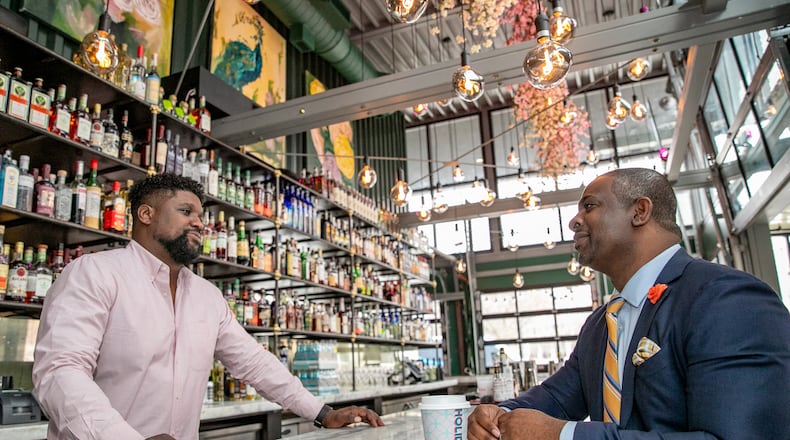Camaran Burke has been in the restaurant industry for decades and witnessed firsthand the devastating effects the pandemic had on food and beverage businesses, especially those owned by minorities and women.
While working with a bar owned by white and minority partners, he noticed how easy that business was able to obtain a government loan to keep their business afloat.
However, he said he quickly realized that his Black friends who owned and operated similar businesses either were denied such loans or given a fraction of the funds the other bar received.
“There were too many restaurants closing and too many of my friends losing jobs,” Burke said. ”I have a way to help.”
In May 2020, Burke created A Seat at the Table Capital consulting group, a venture capital firm specializing in incubating and growing minority-owned hospitality brands, equipping them with business strategies for a successful future. A few of the Atlanta bars under the company are Parlor, Girl Diver, and, his most recent addition Holiday Bar.
Burke’s company joins a growing number of businesses and investment groups in Atlanta that are seeking to fund and assist Black entrepreneurs. Such support is vital as metro Atlanta Black-owned businesses make up a much larger share of the business base than they do at the national level.
Black-owned businesses represent 6.1% of businesses in the city, according to Atlanta Regional Commission. The national average of black businesses is represented at just 2.1%.
“I have seen an increase in equity firms and venture capital firms and angel investing firms,” said Tiffany Howard, a University of Nevada Las Vegas political science professor and recent Congressional Black Caucus Foundation senior research fellow. “I have seen an increase in companies being shifting from, we’re growing our business and now we’re actually going to invest in other businesses and invest in other black-owned businesses and minority-owned businesses.”
Investment in these businesses is more critical now than it has ever been, experts say. Black business ownership nationwide plummeted over 40% between February and April of 2020, the most significant decline amongst any ethnic group, according to the House Committee on Small Business Committee report.
In addition, the report demonstrated that Black-owned businesses in the United States were less equipped to handle mandated city closures during the pandemic due to a lack of financial relief.
Armond Davis, the managing partner of the Paragon Group, said he actively invests in minority and women-owned businesses and commercial real estate projects, hoping to create lasting strategies for the growth of those businesses.
Credit: Jenni Girtman
Credit: Jenni Girtman
Davis said that by investing in minority and women-owned businesses, he can supply access to investment capital and bring diversity to the private-equity and venture capitalist sector that was not made for these types of businesses.
“If we have more blacks and other minorities that are managing funds, and investment funds, then we’ll see a natural movement towards more diversity to the companies that are receiving these investments,” Davis said.
Much of the discussion surrounding Black venture capital funds, usually centers on propping up black-owned tech companies. However, most black businesses are not tech-based, nearly 38% of those businesses are in hospitality services, according to the African American Business guide.
Davis said his company tries to help these businesses grow through its unique mentorship strategy, sharing the “good gospel” while creating an ecosystem of exchange.
Davis and Burke see the demand for businesses like theirs increasing.
“I think entrepreneurship is the lifeblood of any community, and having a strong and stable ecosystem of entrepreneurs is important, particularly to the black community, and particularly to the black community in the south,” Davis said,
While Burke echoed these sentiments.
I think it’s great that we’re seeing specialized funds to push us along,” said Burke. “You’re gonna see who’s really in the community helping out doing the boots on the groundwork and you’re able to hold them accountable. I’m really excited to see what the future holds for everybody involved.”
About the Author
Keep Reading
The Latest
Featured




